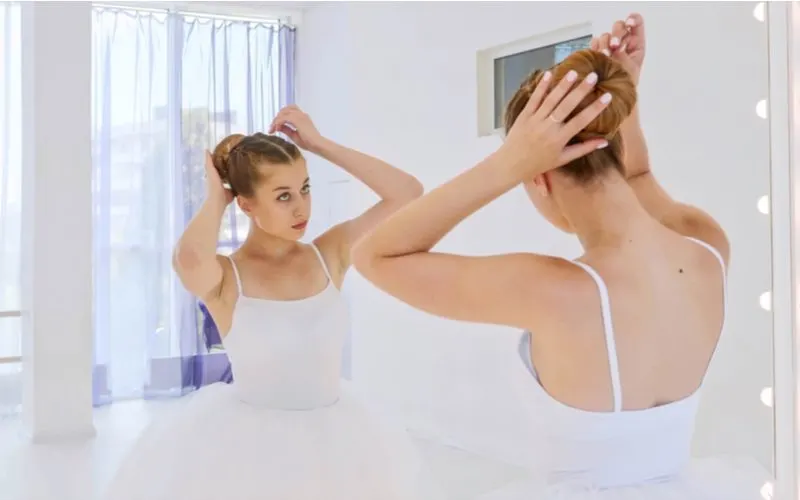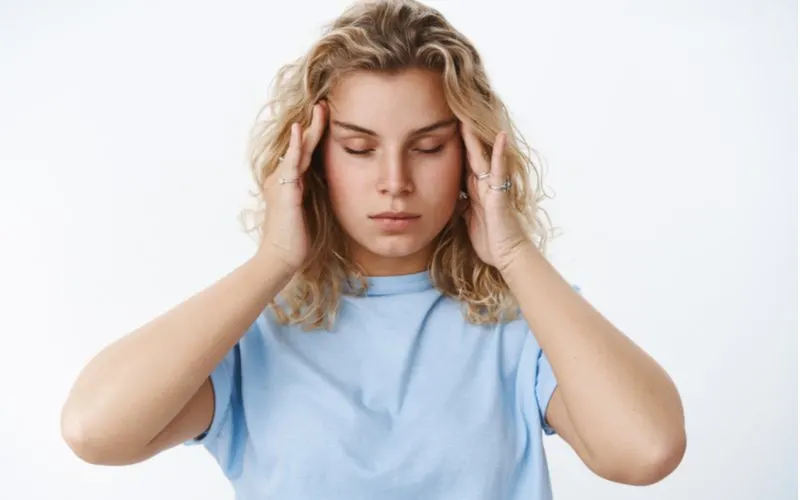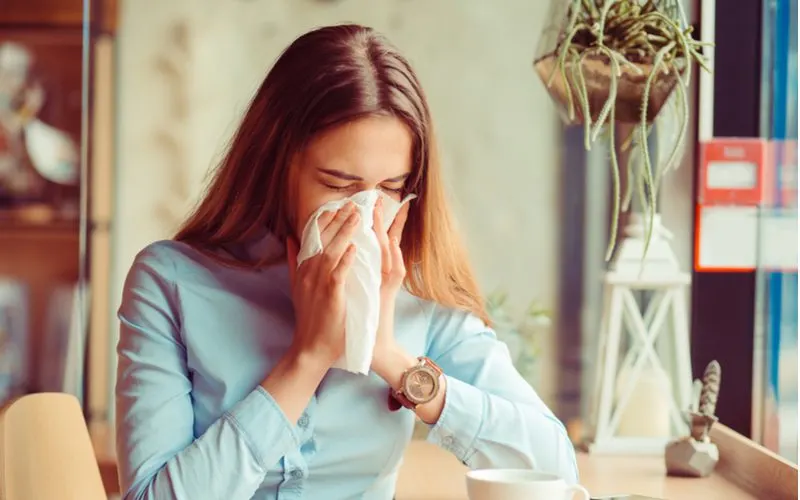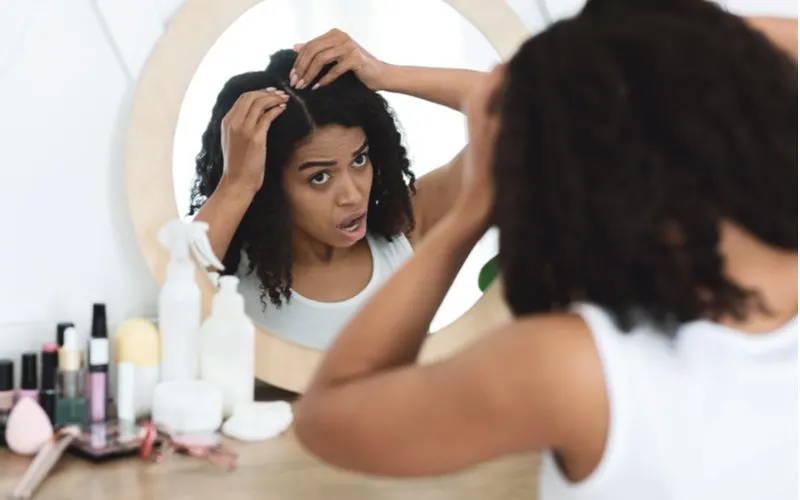Jump to:
If you have been wondering, “why does my hair hurt?” you’re not alone. There are many reasons that your scalp might be sore, but there are also some simple solutions. Read on to learn all you need to know.
Why Does My Hair Hurt?
When we talk about hair hurting, we’re not referring to the hair itself, of course. What people actually mean is that the roots of their hair hurt, causing tenderness across their scalp.
Though the reason behind why your hair hurts isn’t usually serious, it can cause significant disruption in your life. From not being able to wear your hair the way you want to suffering migraines and poor sleep, a sore scalp is really uncomfortable.
Luckily, there are usually a few basic reasons why your scalp hurts, and the solutions are simple as well.
1. Tight Hairdos

Alexander Egizarov/Shutterstock
Wearing your hair in a tight bun, ponytail, or braid can pull on your scalp and cause inflammation at the roots of your hair. This is especially true for styles that are both high and tight, like ballerina buns.
These extremely tight styles actually damage your hair follicles and can even cause splitting at the roots. Not only is this painful, but it can also cause your hair to thin and become brittle.
What makes it even worse? Doing a tight hairstyle when your hair is wet. Water causes hair follicles to expand. As it evaporates, the follicles contract, pulling at your scalp more and more.
What to Do About It
Avoid wearing these styles too often or for too long, as they can cause pain and damage. If you do need to use a tight style — such as for ballet, gymnastics, or other activities — avoid doing your hair when it’s wet.
Some people like to take Advil or ibuprofen if they have a long day ahead of them in a tight hairstyle (such as for a wedding). This can be effective at reducing the inflammation in your scalp and preventing intense pain.
Don’t sleep with your hair in these styles, either. The pressure on your scalp while you lay down will pull your hair follicles even more, causing you to wake up with a sore head.
2. Improper Washing

LightField Studios/Shutterstock
The best hair washing routine varies widely from person to person. It can take some trial and error to learn how often to wash your hair and what products work best for you.
Washing your hair too much or too little can have an effect on how your scalp feels. If you wash it too infrequently, you might experience:
- Oil buildup
- Dandruff
- Inadequate scalp stimulation
On the other hand, washing your hair too often can lead to scalp pain for different reasons. Overwashing can lead to:
- Overproduction of oils
- Hair thinning and damage
What to Do About It
Learning how to care for your hair the right way takes some time, commitment, and research. Some of it depends on the type of hair you have, including thickness, texture, and other aspects.
It’s a good idea to talk to a stylist about your hair type. They can provide some valuable insights into the hair products you need.
3. Migraines

Cookie Studio/Shutterstock
If you suffer from migraines, you may experience scalp pain as well. Migraines can be triggered in some people by small things like hats, bobby pins, or wearing their hair a certain way. Similarly, having a migraine can cause your scalp to be sore.
This condition, known as allodynia, has to do with nerve activity in your brain during a migraine. This causes referred pain that makes your body think that your scalp hurts rather than your head. The mixed-up brain signals can occur more frequently the more often you experience a migraine.
What to Do About It
Unfortunately, there is no simple solution to stopping migraines. But when it comes to allodynia, you can reduce your chances of a sore scalp feeding into a migraine and vice versa by recognizing your triggers.
Avoid wearing things in your hair, putting your hair up in a tight ponytail, or styling your hair while wet if these seem to increase your likelihood of migraine-related scalp pain.
4. Products

Dean Drobot/Shutterstock
Products like dry shampoo can be a great way to keep your hair clean and presentable between washes. But they also cause build-up on the hair shaft, which can cause pain in your scalp.
Why? Simply put, excessive use of products can clog your pores. This leads to a build-up of bacteria like yeast, which can in turn cause your scalp to feel more sensitive.
The longer you go using these products without washing your hair properly, the more likely you are to have discomfort, itching, and inflammation. This can get particularly bad if you’re relying on dry shampoo to help during workouts, adding sweat to the mix.
What to Do About It
Don’t rely on dry shampoo too often. Make sure to wash your hair as frequently as is healthy for your hair type and texture. On average, that’s about every two to three days, though it may be longer or shorter depending on your needs.
In the meantime, use products like dry shampoo sparingly. As long as you stick to a healthy washing schedule, you can avoid unwanted bacterial buildup and subsequent pain.
5. Allergies

HBRH/Shutterstock
Sometimes your scalp can become irritated or inflamed because of an allergic reaction. If you’ve tried switching up your wash schedule and relaxing your hairstyle, try swapping out your hair products. You might be having an allergic reaction to a certain ingredient.
Not all allergic reactions are obvious. They can present as itching, redness, or pain, especially when a topical substance is involved. If you can’t pinpoint the cause of your scalp irritation, you might have an allergy to something in your shampoo, conditioner, or hair styling products.
What to Do About It
Determining an allergy is usually a process of elimination. You’ll have to try swapping out one product at a time to compare how your scalp feels. This might take a while, or it might be obvious after the first few tries.
Luckily, if an allergy is the culprit, the pain in your scalp should calm down after a few days after eliminating the product from your hair care lineup. If you tell your stylist what products you are using, they might have a suggestion for which substance is causing your reaction. They might also know a good alternative or dupe to get the same hair results without irritation.
Things to Consider
When you’re thinking about the cause of your scalp pain and how you can fix it, bear the following things in mind that can affect your hair needs:
- Age. Your age can determine what kind of care your hair needs and how often it needs to be washed to avoid or lessen scalp pain. This is because hair thins and becomes more fragile with age.
- Hormones. Hormonal shifts can also affect your hair needs and scalp sensitivity, especially during drastic changes in hormone levels such as during pregnancy, menstruation, and menopause.
- Hair texture. Hair texture varies widely, which affects how often you should wash your hair. Washing your hair too often or not often enough for your hair texture can cause scalp pain.
- Hair type. Hair type can also play a role in your hair’s needs. You can learn more about your hair type by talking to your stylist.
Frequently Asked Questions

Prostock-studio/Shutterstock
If you’ve been wondering why your hair hurts, you’re not alone! Here are some of the top related questions that people have on this topic:
What Deficiency Causes Scalp Pain?
Scalp pain is not usually connected to a vitamin or nutrient deficiency. However, vitamin deficiencies can be related to poor hair health, including hair loss and breakage.
If you are concerned about the health of your hair, you might want to consider taking a biotin or B7 supplement. This vitamin improves the strength of your hair and nails and may help relieve your scalp pain as well.
Why Does My Hair Hurt When I Move It?
There are quite a few conditions that can cause scalp pain when moving your hair. These include basic issues like scalp buildup or skin allergies or more long-term health conditions like eczema or psoriasis.
If you’ve eliminated a few possibilities and are still experiencing scalp pain when you move your hair, talk to your doctor about the possibility of skin conditions like these.
How Can I Relieve Scalp Pain?
You might be able to find immediate relief by washing your hair and brushing it to stimulate blood flow and remove build-up. Try an over-the-counter anti-inflammatory medication such as ibuprofen. For long-term relief, you’ll have to target the cause of the discomfort.
So, Why Does Your Hair Hurt?
There are many things that might cause your hair to hurt, such improper washing, tight hairstyles, and overuse of products. But these are all very common mistakes and not everyone ends up with a sore scalp. The truth is, we are all individuals, and what hurts you may not hurt another. For this reason, finding out the cause of your scalp pain might take some trial and error before you find a solution.
